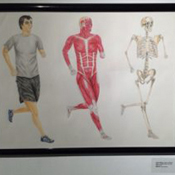DPT Program Stages an Art Show: Using Art to Develop a Heart for the Profession of Physical Therapy

Sue Klappa, PT, PhD, and colleagues discuss how Doctor of Physical Therapy (DPT) students created visual art projects to gain a deeper understanding of how physical therapy transforms society and improves quality of life for patients.

